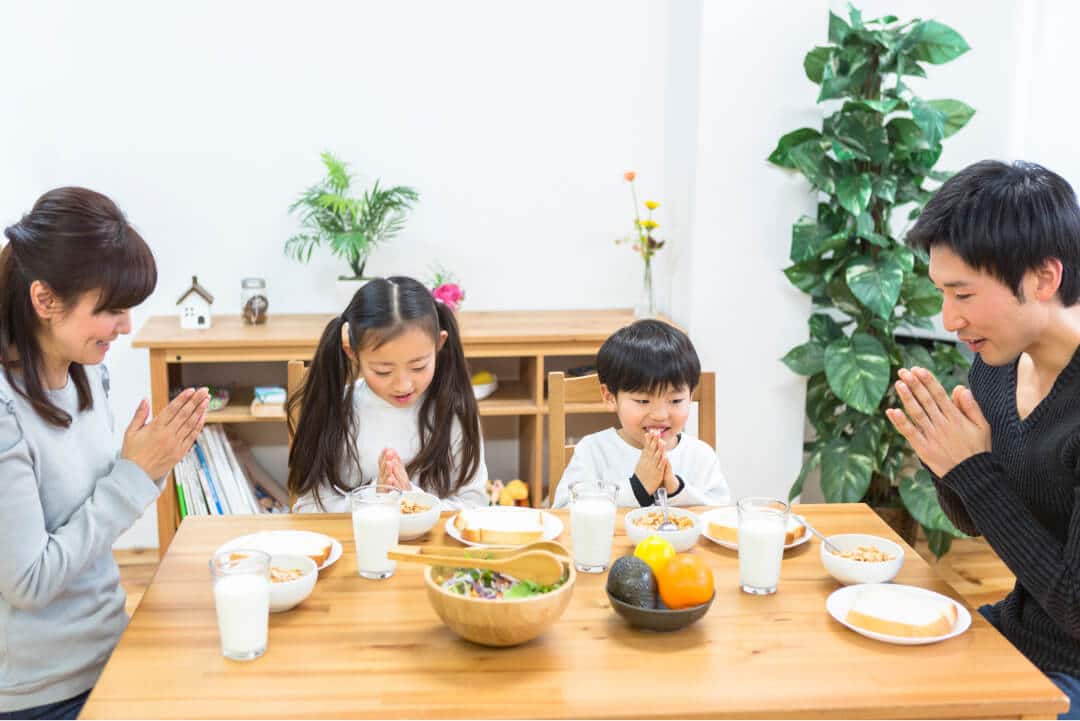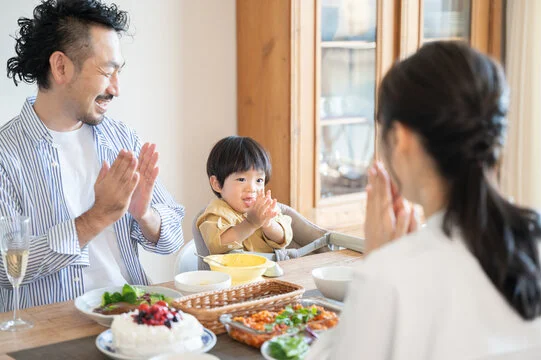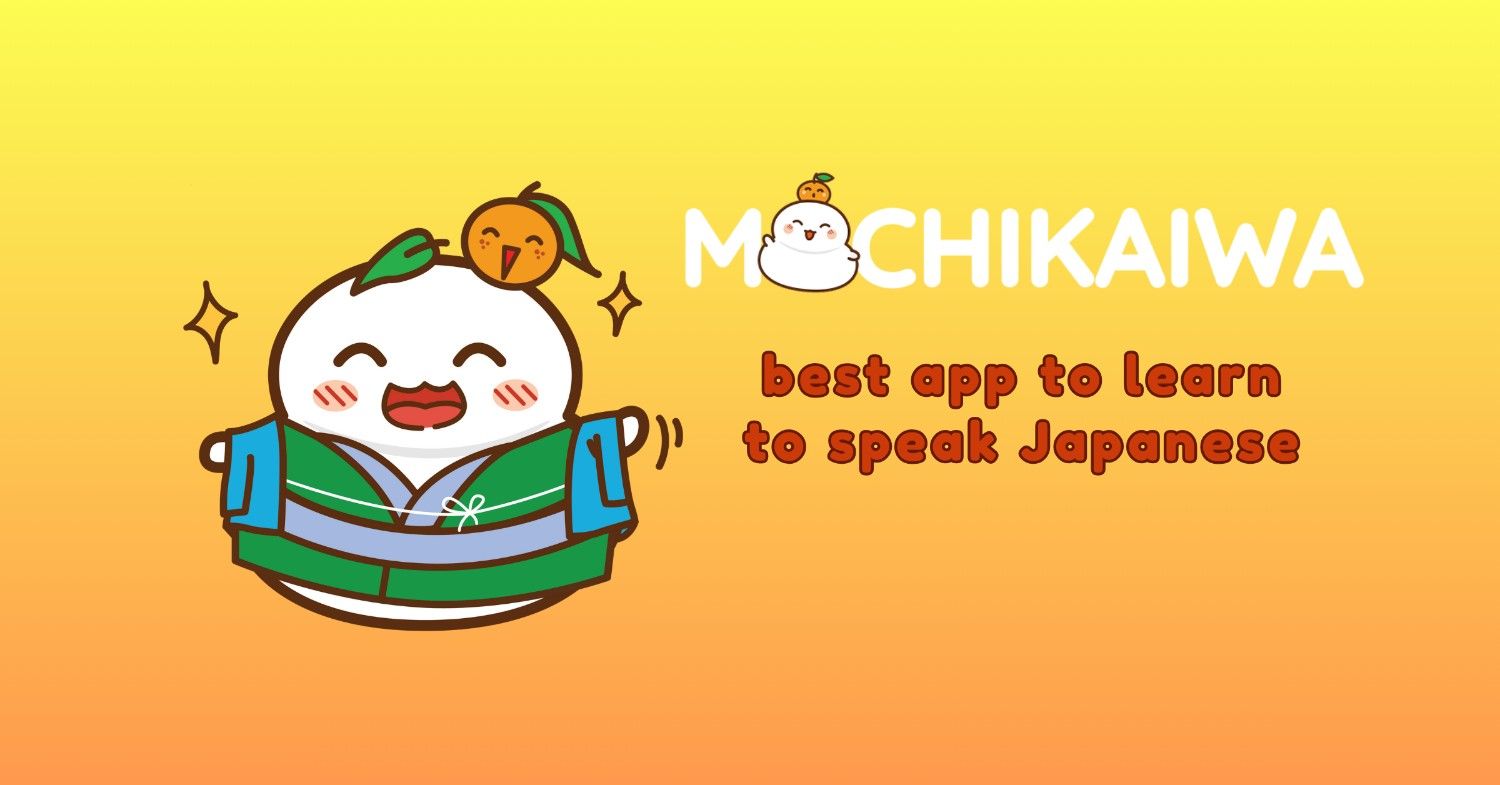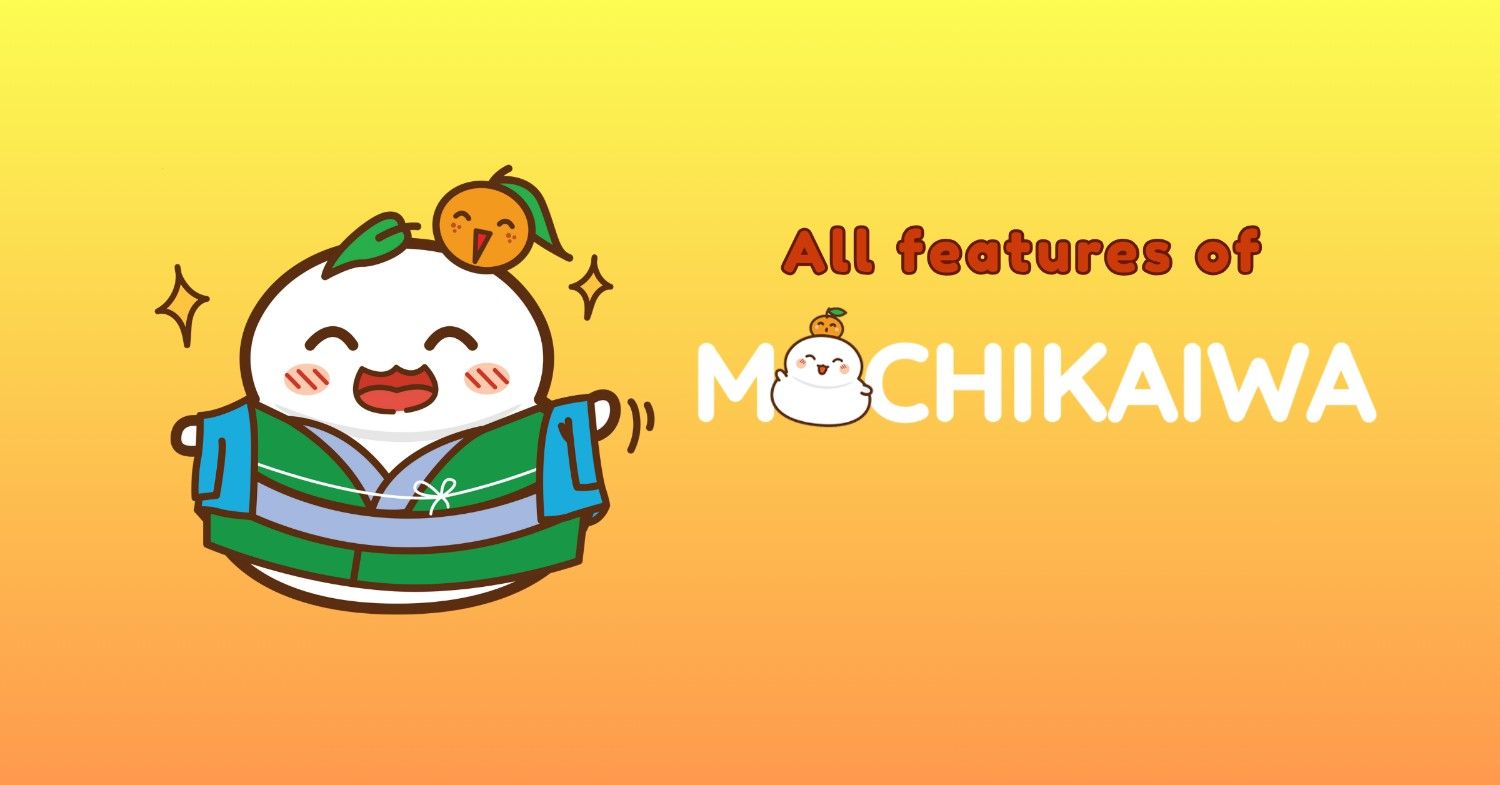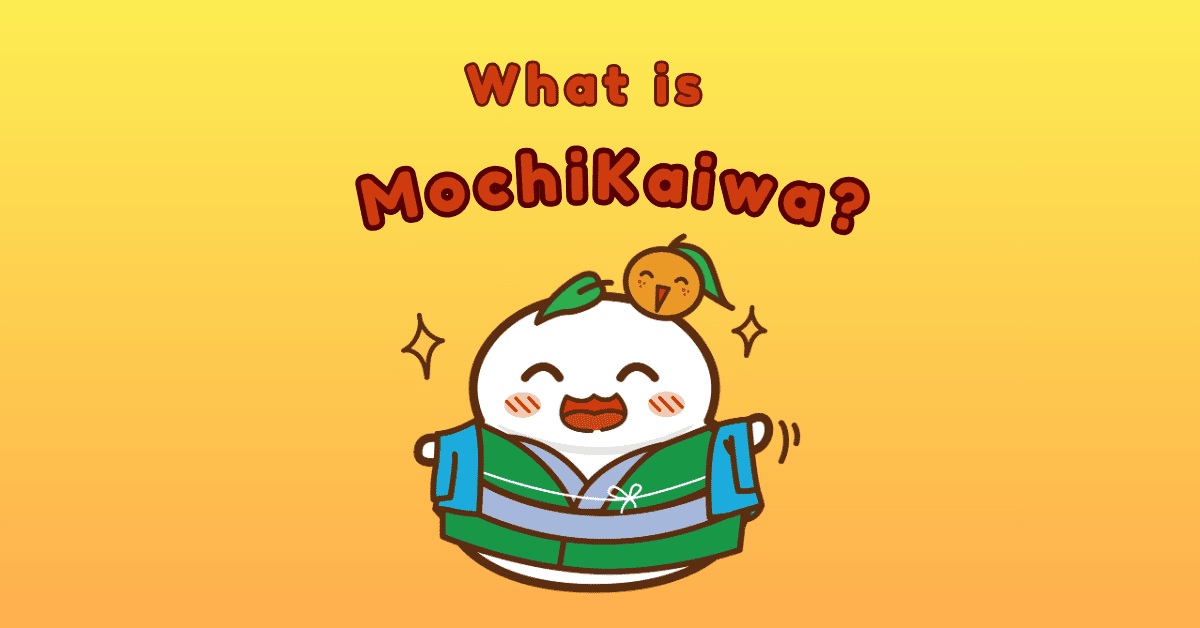Ever wondered what Japanese people say before eating? They usually say “Itadakimasu” – 頂きます before digging into their meals. It’s a way of showing gratitude for the food and everyone who helped prepare it. This simple phrase packs a lot of cultural significance, reflecting respect for the food and the effort behind it. Dive in to learn more about “Itadakimasu” and other cool pre-meal expressions that give you a taste of Japan’s rich traditions.
- We Say “Itadakimasu” Before Eating
- Phrases to Say After Finishing the Food
- Learn About Japanese Culture Through Conversation
- Learn Japanese language and culture through Mochi Kanji App

We Say “Itadakimasu” Before Eating
1. What Does “Itadakimasu” Actually Mean?
The phrase ‘Itadakimasu’ (頂きます) is deeply ingrained in Japanese culture, particularly before partaking in a meal. It is composed of the kanji character 頂く (itadaku), which represents a humble form of the verb ‘to receive’, ‘to get, ‘to accept’, ‘to take’ (humble). When translated, it is often rendered as ‘Let’s eat’ or ‘I humbly receive,’ but its significance goes beyond these literal translations.
The essence of ‘Itadakimasu’ lies in its expression of gratitude and respect. It is an acknowledgment of the interconnectedness of all beings and the effort expended to bring food to the table. When saying ‘Itadakimasu,’ its also the labor of farmers, the catch of fishermen, and the skill of cooks. It represents a moment of mindfulness, reminding individuals to approach their meal with humility and appreciation for the blessings they are about to receive.
The kanji character 頂 (itadaku) carries nuances of receiving something with respect and gratitude. It is often used in religious contexts to express reverence when receiving offerings or blessings. In the context of ‘Itadakimasu,’ it conveys a similar sentiment. This is an acknowledgment of the food as a gift, an expression of thanks to all those involved in its production.
In Japanese culture, ‘Itadakimasu’ is not just a perfunctory phrase uttered before a meal. It is a ritual imbued with meaning. It serves as a reminder of the importance of gratitude, mindfulness, and respect in everyday life, particularly when it comes to something as fundamental as nourishment.”
2. The History of “Itadakimasu”
The history of “Itadakimasu” traces back to ancient Japanese cultural practices, influenced by both Buddhist and Shinto traditions. While the exact origins are difficult to pinpoint, the concept of expressing gratitude before meals has been deeply ingrained in Japanese society for centuries.
In Buddhism, the act of receiving and consuming food is regarded as sacred. Monks traditionally chant prayers of gratitude before meals, acknowledging the interconnectedness of all living beings and expressing thanks for the sustenance provided. This practice of mindfulness and appreciation for food’s origins and impact on the community has permeated Japanese secular customs over time.
Similarly, Shinto, Japan’s indigenous spirituality, emphasizes reverence for nature and the spirits residing in all things. Saying “Itadakimasu” before a meal is a way of honoring these spirits and showing respect for the natural world from which the food is derived.
Over the centuries, these religious influences merged with everyday etiquette, culminating in the widespread practice of saying “Itadakimasu” before meals across Japan. It evolved into a cultural norm, embodying a sense of humility, gratitude, and respect for the food, the people involved in its production, and the act of eating itself.
Today, “Itadakimasu” remains an integral part of Japanese dining etiquette, serving as a reminder of the interconnectedness of all living things and the importance of expressing gratitude for the blessings received. Its history reflects the deep spiritual and cultural roots that continue to shape Japanese society’s values and traditions surrounding food and communal dining.
Phrases to Say After Finishing the Food
After finishing a meal in Japanese culture, it’s customary to express gratitude for the food and the effort that went into preparing it. The most common phrase used for this purpose is:
1. “Gochisousama deshita” (ごちそうさまでした)
This phrase is a polite way to thank the person who prepared the meal and to acknowledge the deliciousness of the food. It can be translated as “Thank you for the meal” or “It was a feast.” The term “gochisou” refers to a feast or a treat, while “sama” is a respectful suffix. Together, they convey appreciation for the hospitality and effort expended to provide the meal. “Deshita” is a polite past tense ending, indicating that the meal has concluded. This phrase is commonly used in various settings, whether dining at home, in a restaurant, or as a guest in someone’s house.
In addition to “Gochisousama deshita,” there are other phrases used to express appreciation after a meal, though they are less common.
2. “Oishikatta desu” (美味しかったです)
This phrase translates to “It was delicious.” It is a simple yet heartfelt way to compliment the cook and express enjoyment of the meal. While less formal than “Gochisousama deshita,” it still conveys gratitude and appreciation for the culinary experience. This phrase is typically used in social situations, such as when thanking a host after a meal or complimenting a chef at a restaurant.
For example, after dining at a friend’s house, one might say:
“Go chisō-sama deshita. Oishikatta desu!” (ごちそうさまでした。おいしかったです!) which means “Thank you for the meal. It was delicious!”
Using “oishikatta desu” shows respect and gratitude, making it a culturally significant phrase in Japanese dining etiquette. It not only conveys satisfaction but also acknowledges the effort put into preparing the meal, fostering positive social interactions.
These phrases reflect the cultural value placed on expressing gratitude and appreciation, not only for the food itself but also for the shared experience of dining together. They contribute to the atmosphere of harmony and mutual respect that characterizes Japanese mealtime etiquette.
Learn About Japanese Culture Through Conversation
The practice of saying “itadakimasu” and “gochisousama deshita” is more than just a part of dining etiquette; it offers a glimpse into the values that underpin Japanese culture. Through dialogue, we can uncover the nuances of Japanese etiquette, the importance of social harmony, and the deep-rooted respect for nature and community. By listening and sharing perspectives, we not only deepen our understanding of Japanese culture but also cultivate an appreciation for its profound insights into living a mindful and harmonious life.
1. Respect for Food
In Japan, food is not merely a commodity but a gift from nature that deserves respect. This respect is shown through mindful eating, minimizing waste, and expressing gratitude.
2. Gratitude and Mindfulness
The expressions used before and after meals encourage a sense of mindfulness and gratitude. They remind people to appreciate the efforts of those who have contributed to their meal and to be thankful for the sustenance provided.
3. Social Harmony
Dining in Japan is a communal activity that reinforces social bonds. Phrases like “itadakimasu” and “gochisousama deshita” are part of the social etiquette that helps maintain harmony and respect among individuals.
4. Interconnectedness of Life
These customs reflect a broader belief in the interconnectedness of all living things. The acknowledgment of the sources of food and the efforts of those who prepare it is a way of recognizing and honoring this interconnectedness.
5. Cultural Continuity
The persistence of these phrases in modern Japanese society, despite the influence of globalization, underscores a strong cultural continuity and the preservation of traditional values.
Japanese culture is rich with traditions and customs that reflect its values and social norms. One such tradition is the practice of saying certain phrases before eating. These phrases, imbued with cultural significance, reflect gratitude, respect, and mindfulness towards food.
The phrases “itadakimasu” and “gochisousama deshita” are small but significant elements of Japanese dining etiquette that reflect the country’s cultural values of respect, gratitude, and mindfulness. They provide a way to honor the food, the people who prepared it, and the natural world that provided it.
Through these simple expressions, one can gain a deeper understanding of the Japanese way of life, where every meal is a reminder of the interconnectedness of all things and the importance of showing gratitude for the blessings we receive. With interactive lessons, pronunciation guides, and cultural insights.
Learn Japanese language and culture through MochiKanji App.
To further immerse yourself in Japanese language and culture, consider using MochiKanji, an innovative app designed to help you master Japanese language and cultural nuances.
With MochiKanji, you can:
– Learn Kanji and Vocabulary: Master essential Kanji characters and expand your vocabulary with interactive lessons and quizzes.
– Great learning method: Using the Mochi Kanji app to learn Japanese offers numerous benefits, especially with its use of spaced repetition system. This scientifically proven method optimizes memory retention by spacing out review sessions based on the learner’s familiarity with each kanji or word. Difficult items are reviewed more frequently, ensuring efficient and long-term retention. The app also focuses on essential vocabulary, helping users quickly build a solid foundation in Japanese. Additionally, it provides cultural insights, making the learning experience both comprehensive and engaging. This combination fosters a deeper understanding of both the language and the culture.
– Improve Pronunciation: Perfect your pronunciation with audio recordings of native speakers and pronunciation guides for common phrases.
– Practice Writing: Hone your writing skills with writing exercises and stroke-by-stroke guides for Kanji characters.
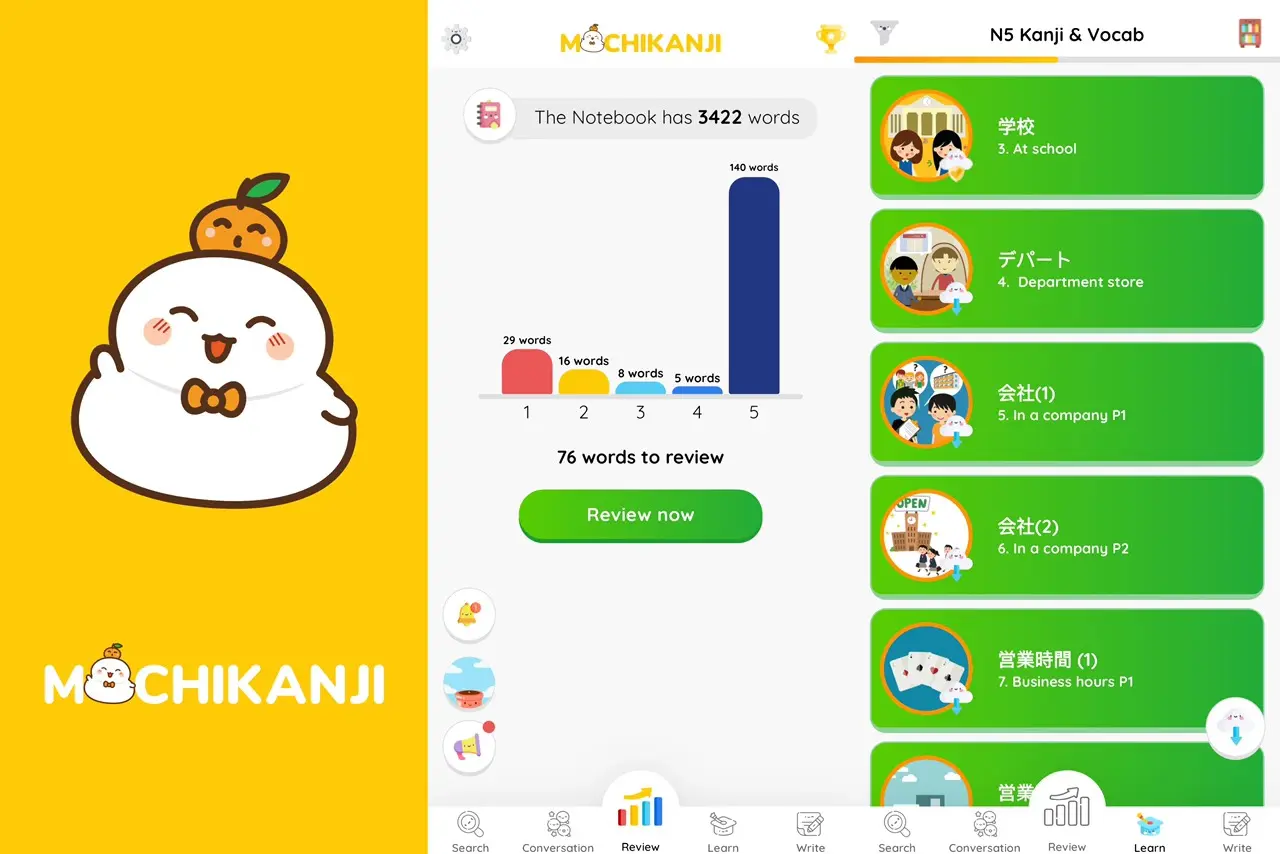
MochiKanji provides a comprehensive learning experience that goes beyond language proficiency, helping you appreciate the cultural nuances embedded in Japanese language and daily life. Download MochiKanji today and embark on your journey to mastering Japanese language and culture!
Start your free trial now!

